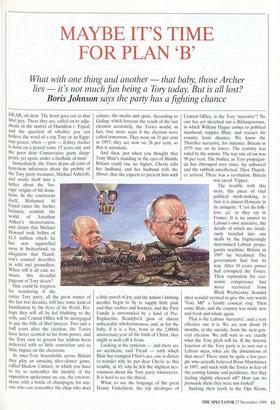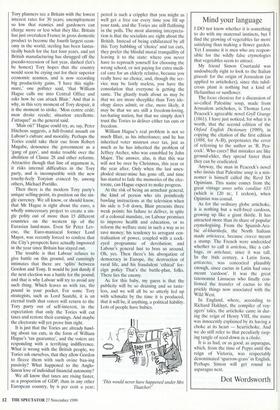MAYBE IT'S TIME FOR PLAN B'
What with one thing and another — that baby, those Archer lies — it's not much fun being a Tory today. But is all lost? Boris Johnson says the party has a fighting chance
DEAR, oh dear. The heart goes out to that libel jury. There they arc, called on to adju- dicate in the matter of Hamilton v. Fayed, and the question of whether you can believe the word of a top Tory or an Egyp- tian grocer, when — pow — Jeffrey Archer is hoist on a petard some 13 years old, and the poor dear Conservative party disap- pears, yet again, under a fusillade of mud. Immediately, the Times draws all sorts of hem-hem inferences about the probity of the Tory party treasurer, Michael Ashcroft, and works itself into a lather about the `for- eign' origins of his dona- tions. In the courtroom itself, Mohamed Al Fayed raises the Archer business, reminds the world of Jonathan Aitken's incarceration, and claims that Michael Howard 'took bribes of £1.5 million which he has now squirrelled away in Switzerland; an allegation that Hamil- ton's counsel describes as wild and groundless. When will it all end, we moan, this dreadful pageant of Tory sleaze?
One could be forgiven for wondering if the entire Tory party, all the great names of the last two decades, will face some kind of humiliation by the News of the Work/. Per- haps they will all be led blubbing to the cells, and Central Office will be mortgaged to pay the bills of libel lawyers. Two and a half years after the election, the Tories have never seemed so far from power, and the Tory case to govern has seldom been delivered with so little conviction and so little impact on the electorate.
In once-Tory households across Britain they play an amusing after-dinner game, called Shadow Cabinet, in which you have to try to remember the identity of the Opposition spokesman on, say, the environ- ment; with a bottle of champagne for any- one who can remember the chap who does culture, the media and sport. According to Gallup, which forecast the result of the last election accurately, the Tories would, in fact, lose more seats if the election were called tomorrow. They were on 31 per cent in 1997; they are now on 28 per cent; so that is axiomatic.
And then, just when you thought that Tony Blair's standing in the eyes of Middle Britain could rise no higher, Cherie tells her husband, and her husband tells the Mirror, that she expects to present him with
a little parcel of joy; and the nation's knitting needles begin to fly to supply little pink and blue sockies and bootees, and the First Family is surrounded by a kind of Pre- Raphaelite, Readybrek glow of almost unbearable wholesomeness, and, as for the baby, if it is a boy, born in the 2,000th anniversary year of the birth of Christ, they might as well call it Jesus.
Looking at the cynicism — and there are no accidents, said Freud — with which Blair has trumped Ffion's ace, one is driven to wonder why he put dear Cherie to this trouble, at 45; why he felt the slightest ner- vousness about the Tory party whatsoever. It is hard to see the threat.
What, to use the language of the great Danny Finkelstein, the top ideologue of Central Office, is the Tory `narrative'? No one has yet sketched out a Bildungsroman, in which William Hague comes to political manhood, topples Blair, and rescues his country from disaster. We know the Thatcher narrative, for instance. Britain in 1979 was on its knees. The country was ruled by the unions. The top rate of tax was 98 per cent. The bodies, as Tory propagan- da has chirruped ever since, lay unburied and the rubbish uncollected. Then Thatch- er arrived. There was a revolution. Britain was saved. Yippee.
The trouble with this story, this piece of vital political myth-making, is that it is almost Homeric in its antiquity. 'C'est du folk- lore, ca, as they say in France. It is no answer to Labour's own narrative, the details of which are insidi- ously treaded into our skulls by the frighteningly determined Labour propa- ganda machine: Britain in 1997 lay becalmed. The government had lost its way. After 18 years, power had corrupted the Tories. Their reputation for eco- nomic competence had never recovered from Black Wednesday. Scandal after scandal seemed to give the very words `Tory MP' a faintly comical ring. Then came Blair, and the country was made new and fresh and whole again.
That is the Labour `narrative', and a very effective one it is. We are now about 18 months, at the outside, from the next gen- eral election. We still wait to see exactly what the Tory pitch will be. If the historic function of the Tory party is to sort out a Labour mess, what are the dimensions of that mess? There must be quite a few peo- ple who actually believed Brian Mawhinney in 1997, and stuck with the Tories in fear of the coming famine and pestilence. Are they feeling slightly cheesed off? How can we persuade them they were not fooled?
Sucking their teeth in the Ops Room, Tory planners see a Britain with the lowest interest rates for 30 years; unemployment so low that nannies and gardeners can charge more or less what they like. Britain has just overtaken France in gross domestic product to become the fourth largest econ- omy in the world; sterling has been fantas- tically butch for the last four years, and yet British manufacturing has shrugged off the pseudo-recession of last year, dashed (let's be honest) Tory hopes that the country would soon be crying out for their superior economic acumen, and is now recording big productivity gains. 'I have this night- mare,' one pollster said, 'that William Hague calls me into Central Office and asks how he can attack Blair.' And that is why, in this very moment of Tory despair, it is the moment to strike. 'Mon centre cede; mon droite recule; situation excellente. J'attaquel' as the general said.
'Mais oil?' Hague could try, as, say, Peter Hitchens suggests, a full-frontal assault on Labour's culture and morality. Perhaps the Tories could take their cue from Robert Mugabe, denounce the government as a 'gang of gays', and make trouble over the abolition of Clause 28 and other reforms. Attractive though that line of argument is, it risks internal difficulties in the Tory party, and is incompatible with the new touchy-feely Toryism evinced by, among others, Michael Portillo.
Then there is the modern Tory party's unique selling-point, its position on the sin- gle currency. We all know, or should know, that Mr Hague is right about the curo, a wholly unnecessary project to create a sin- gle polity out of more than 15 different countries on the western tip of the Eurasian land-mass. Even Sir Peter Lev- ene, the Euro-maniacal former Lord Mayor, was recently forced to confess that the City's prospects have actually improved in the year since Britain has stayed out.
The trouble is that Labour refuses to give battle on this ground, and cunningly intimates that there are 'splits' between Gordon and Tony. It would be just dandy if the next election was a battle for the pound; and that is why Labour will try to avoid any such thing. Which leaves us with tax, the pound in your pocket. For some Tory strategists, such as Lord Saatchi, it is an eternal truth that voters will return to the Tory party out of self-interest, in the expectation that only the Tories will cut taxes and restore their earnings. And maybe the electorate will yet prove him right.
It is just that the Tories are already bawl- ing about tax cuts, in the form of William Hague's 'tax guarantee', and the voters are responding with a terrifying indifference. What is wrong with the British people, we Tories ask ourselves, that they allow Gordon to fleece them with such ovine baa-ing passivity? What happened to the Anglo- Saxon love of individual financial autonomy?
We all know that taxes are rising faster, as a proportion of GDP, than in any other European country, by 6 per cent a year; petrol is such a crippler that you might as well get a free car every time you fill up your tank, and the Tories arc still flatlining in the polls. The most alarming interpreta- tion is that the socialists arc right about the British. Instead of being exhilarated by all this Tory babbling of 'choice' and tax cuts, they prefer the blissful moral tranquillity of leaving it to the state: where you never have to reproach yourself for choosing the wrong school, or not paying for extra medi- cal care for an elderly relative, because you really have no choice, and, though the ser- vice may be fairly useless, you have the consolation that everyone is getting the same. The ghastly truth about us may be that we are more sheeplike than Tory ide- ology dares admit; or else, more likely, it may be that we are still a freedom-loving, tax-hating nation, but that we simply don't trust the Tories to deliver either tax cuts or freedom.
William Hague's real problem is not so much Blair, as his inheritance; and he has inherited voter mistrust over tax, just as much as he has inherited the problem of Jeffrey Archer, who was ennobled by John Major. The answer, alas, is that this war will not be over by Christmas, this year or the year after. Only when the last unex- ploded sleaze-mine has gone off, and time has started to fade the memories of the elec- torate, can Hague expect to make progress.
At the risk of being an armchair general, the kind of person who sits pointlessly bawling instructions at the television when his side is 5-0 down, Blair presents three weak points: his failure to deliver, in spite of a colossal mandate, on Labour promises to improve health and education, or to reform the welfare state in such a way as to save money; his tendency to arrogant cen- tralisation of power, coupled with a cock- eyed programme of devolution; and Labour's general lust to boss us around. Oh, yes. Then there's his abrogation of democracy in Europe, the destruction of rural life, and his fraudulent 'ethical' for- eign policy That's the battle-plan, folks. There lies the enemy.
As for this baby, my guess is that the publicity will be so draining and so taste- less, and we will all be so utterly fed up with schmaltz by the time it is produced, that it will be, if anything, a political liability. Lots of people have babies.
'This would never have happened under Mrs Thatcher!'



























































































 Previous page
Previous page